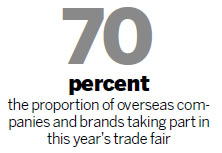

Consumers are attaching more importance to high-end lifestyle-related household products amid the gloomy real estate market and economic slowdown.
Interior Lifestyle China 2012, or the China International Trade Fair for Household Products and Accessories, which ended on Saturday in Shanghai, is just one example of this trend.
The event, which was backed by organizations including Germany's Federal Ministry of Economics and Technology, the Association of the German Trade Fair Industry, and the French Agency for International Business Development, attracted a record 248 companies from 15 countries and regions, up around 10 percent year-on-year.
"Apart from reaching a historic high in terms of the number of companies joining us this year, the proportion of overseas companies and brands taking part in this exhibition went up from 30 percent six years ago to 70 percent this year," said Sha Yiwen, deputy general manager of Messe Frankfurt (Shanghai) Co Ltd.
"This tremendous change reflects the Chinese retail market's huge potential in terms of lifestyle-related high-end products."
Sha added that the development of the property industry and the changing consumption habits of the post-1980 and post-1990 generations have had a major impact on China's home appliance retail market.
"When we established the show several years ago, the concept of Interior Lifestyle China was based on the assumption that we would see an increase in domestic demand as well as brand awareness," said Nicolette Naumann, vice-president of Ambient/Tendence of Messe Frankfurt.
"As an international trade fair for household products and accessories, it features a variety of prominent European brands. At the same time, we are expecting a further rise in the number of Chinese businesses positioning themselves as brands within the short-term future."
Likuai China, the first Chinese company to enter the imported tableware and household products business, and which now has 320 sales channels in 60 cities, has experienced the growing popularity of high-end household products over the past 16 years.
"Most Chinese families were living in a 30- to 40-square-meter apartments 20 years ago. But 100 to 200 sq m commercial residential apartments are mainstream now. The owners of these apartments will become the major consumers of high-end home products," said Xiang Xijun, president of Likuai China.
People with higher incomes are the company's major targets, a group that accounts for around 5 to 8 percent of consumers in China.
"Strictly speaking, all industries are strongly reliant on the development of the entire economy. High-end imported home appliances or lifestyle-related products are closely associated with the property market," said Xiang, whose company's products generally cost 500 yuan ($80) and 1,000 yuan a piece.
Xiang added that the development of Likuai, and other companies in the sector, has largely relied on the growth of China's property industry over the past two decades.
Unexpectedly, he sees the government's tightening controls on the property market as an opportunity for the household products industry.
"We are already happy to see that consumers are spending more on home products with money which was originally to invest in more properties," he said.
China's economy expanded by 7.6 percent year-on-year in the second quarter, slowing from 8.1 percent in the first quarter. The growth rate was the slowest pace since the first quarter of 2009.
Against that backdrop, Likuai's sales revenue has grown by 25 percent so far this year, a figure that could rise to 35 or 40 percent should the property market start booming again, Xiang said.
In recent years the company's annual sales revenue growth was around 50 percent.
"The mindset of Chinese consumers is changing with people's incomes rising, living conditions improving ... Once such a mindset is more widely accepted, the Chinese home products industry will witness rapid development. At present, we are already happy to witness the consumer group expanding from the pyramid's tip to the lower part," said Xiang.
shijing@chinadaily.com.cn
 Toyota not to close China factories
Toyota not to close China factories Audi: Local models, not price cuts, hold the key
Audi: Local models, not price cuts, hold the key Overseas energy projects get green light
Overseas energy projects get green light Use of RMB as settlement currency rise
Use of RMB as settlement currency rise